56 Main Street
Owego, NY 13827
Main Phone:
607-687-8274
A comprehensive search tool enabling you to look up how to dispose of a wide variety of items can be found by CLICKING HERE.

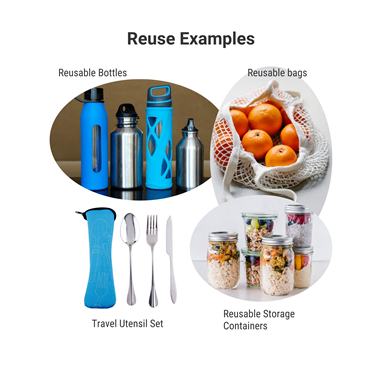
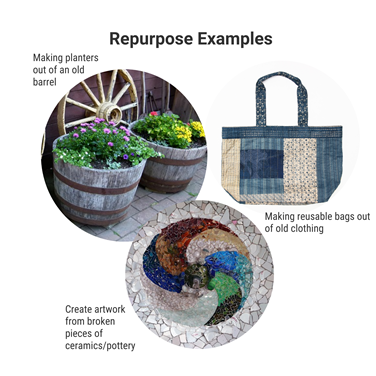
![]()
What is reuse/repurpose?
Reuse is simply defined as items we can use the same thing many times. Repurpose is creating or using something for a purpose other than its original intended use. Repurposing an item can be done by modifying it to fit a new use, or by using the item as is in a new way.
Why is reuse/repurpose important?
Reuse helps to conserve resources, prevent pollution and save money.
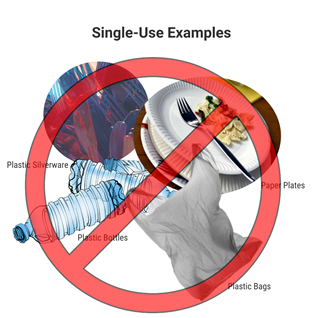
How can you incorporate more REUSE in your life?
Use reusable containers such as mason jars, cloth bags, and reusable bottles.
Whether it is hosting or shopping at a garage sale, pulling over for that item with a “free” sign, bringing your no-longer-wanted clothes to a local charity or drop-box, or listing an item on craigslist or Facebook marketplace, there are many ways to reuse durable goods. By keeping the item in play, you just saved the fossil fuels, water, virgin materials, and energy that it took for that product to come to be.
You can be proud of the resource conservation you are involved in. Setting this example is an important part of normalizing reuse and welcoming it as we make strides towards a more circular economy.
If you need help, there are organizations that will help you fix items. One such organization is the Ithaca Fixers Collective Fixers Collective | Finger Lakes ReUse (ithacareuse.org/fixers/)
Private:
Taylor Garbage Owego (352 Glenmary Dr, Owego) & Barton (1216 Route 17C, Barton) Transfer Stations accept garbage and recycling drop off from residents in Tioga County. For more information, call Taylor's Transfer Stations at 607-687-6710 (Owego) or 607-565-8170 (Barton).
Municipalitiy:
Town of Richford Solid Waste/Recycling/E-Waste – Richford, New York (richfordny.com)
Taylor Garbage - Casella – 607-797-5277
Greenleaf Recycling - 607-738-5004
Dependable Disposal - 607-565-5100
Bert Adams Disposal - 607-648-4863
Casella - 607-358-7771
Contracts with private hauler to collect garbage and recycling within the Village. For more information call Village of Newark Valley at 607-642-8686.
Contracts with private hauler to collect garbage and recycling within the Village. For more information call the Village of Spencer at 607-589-4310 or see their website at https://villageofspencer.com/services/#garbage
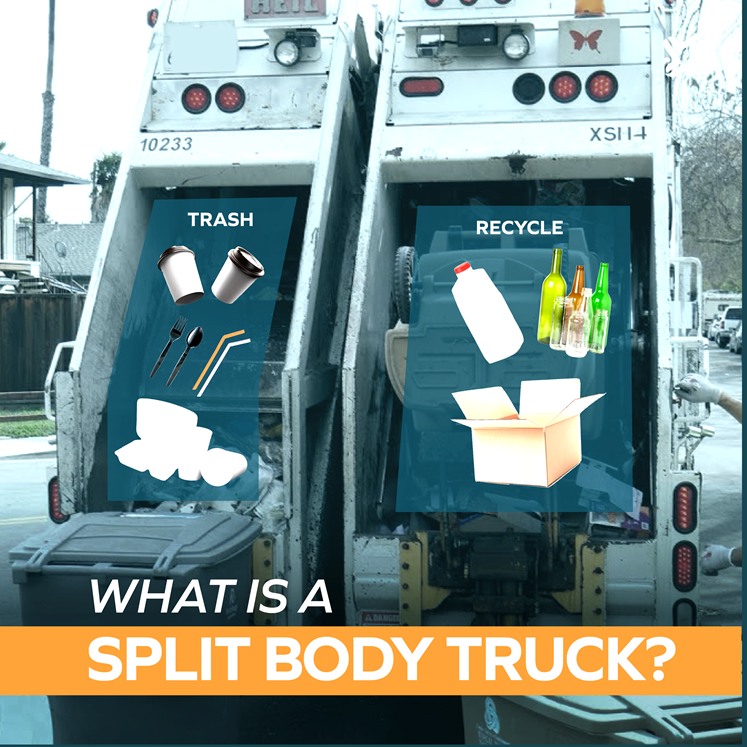
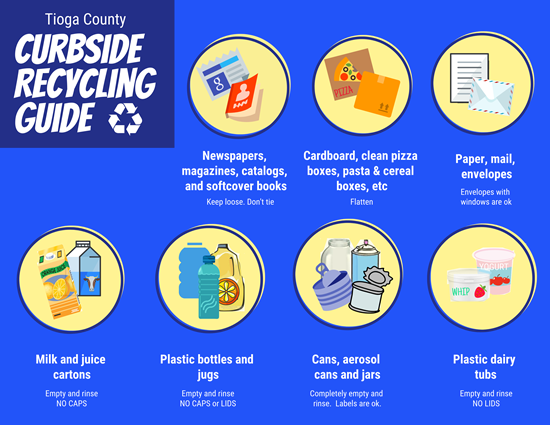
Please make sure all plastic containers have a number 1 - 7 on them
Quick Curbside Recycling Guide
PAPER RECYCLING
SHREDDED PAPER
If you shred at home, place shredded paper in a clear or opaque plastic bag, so it's contained and the recycling staff can see what it is. It is best if you use one of the shredding events held by local banks and credit unions.
CARDBOARD
DO NOT RECYCLE - (place these items in your trash)
GLASS CONTAINERS
No window pane glass, mirrors, ceramics, plates, cups or light bulbs
PLASTICS - with numbers 1 - 7 only
No plastic bags*, plastic film*, Styrofoam, packing foam, packing peanuts, "clamshell" containers, utensils and plates.
METAL
NO pots & pans, utensils, hangers, wire, cords, small appliances or other scrap metal - Bring these items to one of the Transfer Stations - Owego 352 Glen Mary Dr, Owego or Barton 1216 Route 17C, Barton.
ABSOLUTELY NO PLASTIC BAGS OF ANY KIND
This includes grocery bags, department store bags, Ziploc bags and garbage bags
*Plastic bags and plastic film can be recycled through bag recycling programs at store locations
NO-Plastic Pouches
NO-Plastic or Food Wrap
NO-Plastic Lids or Caps
NO-Prescription VIALS (the cylindrical orange/brown medicine containers)
NO-Feed, Pet Food, Pellet or Coal Bags
NO-Styrofoam
NO-Light bulbs
NO-Glasses, Glass Plates or Cookware
NO-Window Glass
PLACE THESE IN YOUR TRASH
To replace or receive a new curbside recycling bin, please contact your private or municipal hauler.
Putting your recycling out the night before your pick-up day to prevent being missed.
Household hazardous waste is unusable home and garden products, which contain hazardous chemicals. Examples are pesticides, fertilizers, household cleaners, driveway sealers, and pool chemicals.
The improper use, storage or disposal of household hazardous waste may pose a risk to the health of humans, animals and the environment.
To reduce these risks, Tioga and Broome Counties have worked to include Tioga County residents in the use of Broome County’s permanent Hazardous Waste Collection Facility. Wastes will be packed and shipped by trained personnel and disposed of in an environmentally safe manner.
Print the confirmation letter below and BRING IT with you on any of the designated collection days scheduled. Proof of Tioga County Residency is required.
2025 DESIGNATED COLLECTION DATES
April 2, 5 & 19 August 6, 9 & 23
May 3, 7 & 17 September 3, 6 & 20
June 4, 7 & 21 October 1, 4 & 18
July 2, 12 & 26 November 1, 5 & 15
Between 7:30 am and 11:30 am to the Hazardous Waste Collection Facility located at the Broome County Nanticoke Landfill, 286 Knapp Road, Binghamton, NY 13902.
Please do not bring hazardous waste to the Owego or Barton Transfer Stations.
There is NO CHARGE, but Tioga County residents must come on a designated collection day between 7:30am-11:30am only.
MATERIALS ACCEPTED:
Please see "Recycling Search Tool" for disposal methods of specific items
Many Tioga County municipalities have cleanup events that include electronic recycling. Check with your town to see if they include electronics during their cleanup event.
Town of Richford Electronic Recycling Program is now opened to all Tioga County residents. For more information see their website:
Solid Waste/Recycling/E-Waste – Richford, New York (richfordny.com)
React Inc. E-cycling
225 Colonial Dr, Horseheads, NY 14845
(607)739-8401
ICS Industries - PLEASE CALL FIRST
7 Badger Ave, Endicott, NY, 13760
Tom Kennedy: 607-757-0025 or 607-759-8300
Residential: electronics & metal recycling free of charge for any electronics except CRT TVs & monitors
Commercial: All electronics recycling, hard drive shredding, paper & media destruction for a fee. Call or email for details.
Best Buy
Vestal
3209 Vestal Parkway East, Vestal, NY
607-777-1489
Elmira
950 County Road 64, Elmira, NY 14903
(607) 739-9471
For full program details visit Best Buy e-recycling program website
Check with store for more info & hours.
Staples
Vestal
3701 Vestal Parkway East, Vestal NY
607-797-2524
Elmira
Website: www.staples.com
Check with location for hours of operation & accepted material- (Computers only- no TV's)
Red Barn Computers
370 Pine Street, Binghamton, NY 13901
607-771-1888
Accepts all brands & types.
Searchable Database: DirectTVdeals- https://www.directvdeals.com/resources/tv-recycling/

Looking for a way to recycle at your next community event? Consider the Borrow-A-Bin program.
The Borrow-A-Bin program is a free service that aims to maximize waste diversion at events in Tioga County by loaning up to 40 beverage recycling bins to local events, large or small.
How to Borrow-A-Bin:
Planning an Event with Recycling:
Helpful Tips:
What to recycle?
You should examine your waste stream to determine what to target. Generally, at festivals, fairs and events food and plastics are a large quantity of the waste. The following items should be targeted for recycling:
Aluminum cans, glass bottles, plastic bottles, tin and cardboard.
Examine what food & beverages are being vended. Most often bottles and cans will be one of the primary recyclables collected.
Typically, vendors (and exhibitors) produce most of the corrugated cardboard waste at special events. Therefore, cardboard collection points need not be located at public recycling stations, but can be staged behind the scenes, near dumpsters. If sufficient staff is available, circulate around vendor areas to collect cardboard as it is generated. The added convenience may encourage vendors, who were not otherwise inclined, to recycle.
Vendors And Staff
Work closely with all staff and event vendors to ensure proper recycling is being conducted and promoted. Work to encourage waste reduction.
Vendors should be clear on how and when recyclables will be collected.
Staff should be prepared to empty recycling containers on a routine basis, so none overflow.
Staff should be instructed where to properly place recyclables for pickup.
Be sure to continue good recycling practices during the breakdown of the event.
Contracting With a Hauler
In Tioga County your garbage hauler can also provide recycling services for a small fee.
Contact a local hauler to set up hauling of recyclables to a designated recycling facility.
Work with hauler to get an appropriately sized container.
Review preparation guidelines to ensure materials are properly prepared for collection by the hauler or recycler. For example, if recyclables can remain bagged.
Suggested Educational, Signage, & Promotion Ideas:
Tioga County Sustainability has partnered with Tioga County Soil & Water Conservation District to offer Earth Machine Composters for sale year-round for Tioga County residents. We are selling the bins for $44. They can be purchased by printing* and completing the order form and making out a check to Tioga County Treasurer and mailing it to Tioga County Sustainability, 56 Main Street, Owego, NY 13827.
Tioga County Sustainability will mail instructions on how to collect your new Earth Machine compost bin.
If you have any questions, please contact us either by email [email protected] or call 607-687-8274.
* If you do not have a printer, please clearly write all the information requested on the order form on a piece of paper, make a check out to Tioga County Treasurer and mail both to Tioga County Sustainability, 56 Main Street, Owego, NY 13827.
Backyard composting is an effective way of recycling organic wastes such as leaves, grass and food scraps that are generated at home. Composting at home is easy and helps to keep waste out of our landfills.
For more information on improving your home composting checkout the following Tioga County’s Cornell Cooperative Extension website
There are many materials you can compost. The following diagram provides some guidance to what materials are acceptable for composting and those materials it is generally recommended to omit for composting.
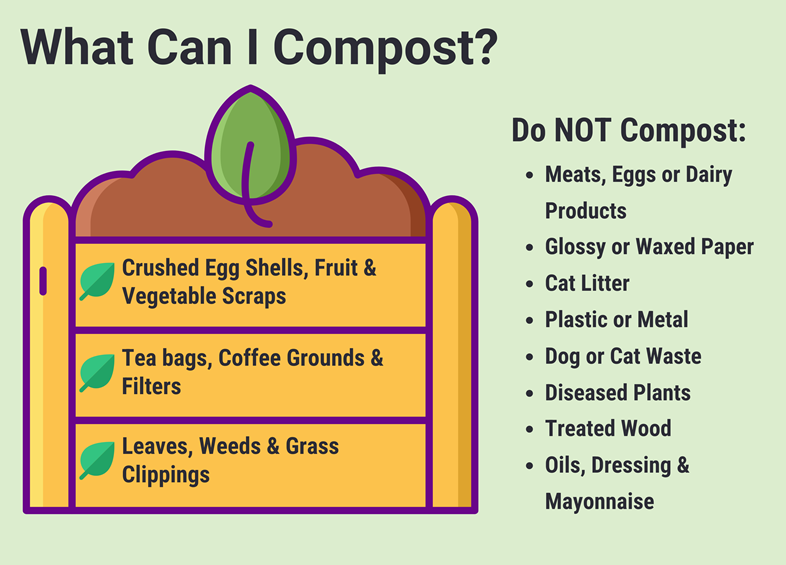
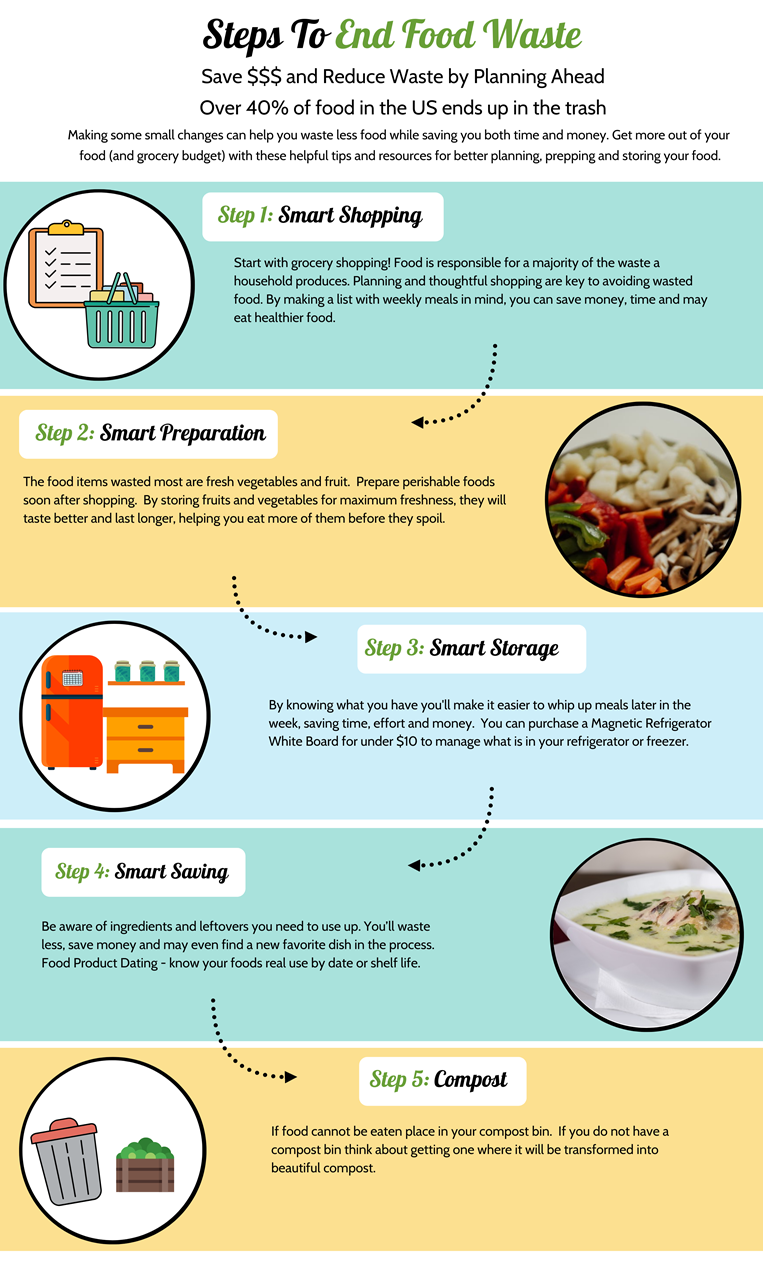
Please call to confirm before dropping off items.
Please DON’T throw away before looking into alternatives! Every year New York State residents and businesses throw away almost 1.4 billion pounds of usable and recyclable textiles.
Open Door Mission - 687-1121 or visit their website http://opendoormissionandthereddoor.weebly.com/
Please call to confirm before dropping off items
These items may be taken to the Open Door Mission (687-1121 or http://opendoormissionandthereddoor.weebly.com/) or placed in one of the many bins throughout Tioga County. These items do NOT have to be in "wearable" or perfect condition; they should, however, be clean and dry. For more information on available locations throughout the Southern Tier please visit the Textile Recovery Locations website.
***Only Dispose if wet or contaminated (for example: grease, mildew, odors), please place in trash.
Everyday household products can contain hazardous chemicals. Over 1.5 million human poisonings are reported each year to poison control centers and over 90% of the poisonings take place in the home. So, when choosing a cleaning product, ask yourself, is my family going to be in contact with dangerous chemicals? Here is a list of less toxic alternatives to some common household products.
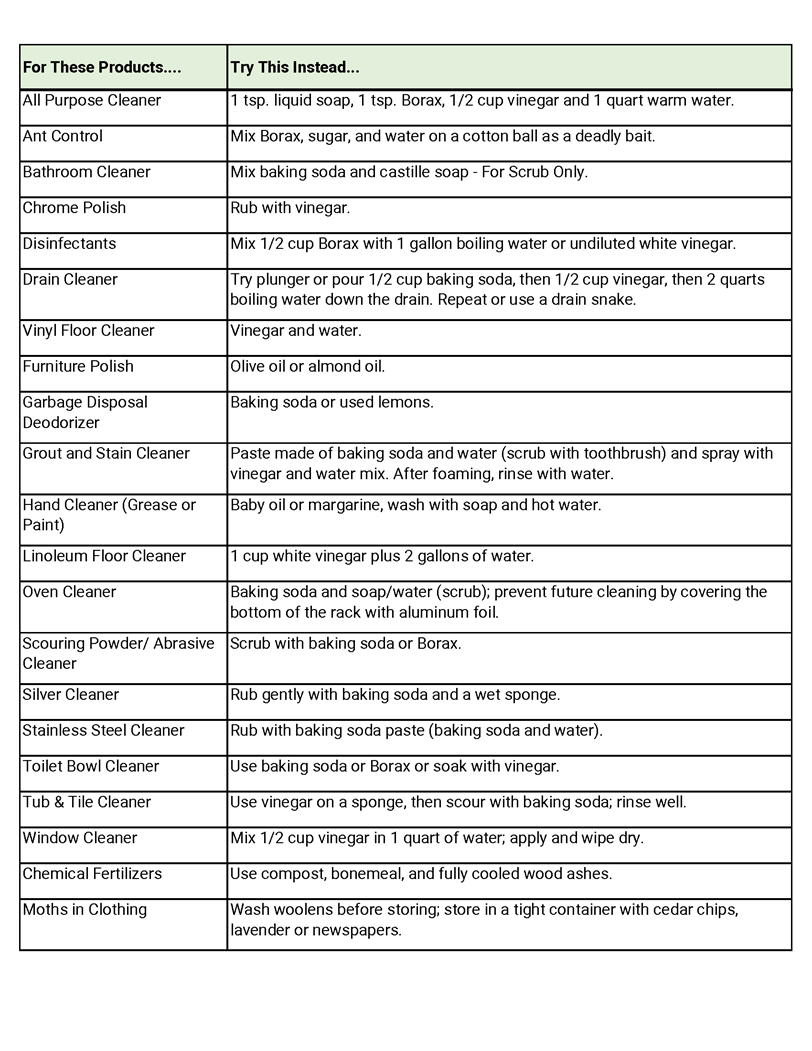
Do you have leftover or expired medications and don’t know how to dispose of them? Do not flush them down the toilet or throw them out! Pharmaceuticals are very hard to filter out of water and soil once they are in the environment and persist for a very long time.
Tioga County Sheriff’s Office -
Medication Drop Box is located in the main lobby of the Tioga County Sheriff’s Office at 103 Corporate Drive, Owego, NY. The drop box is available Monday through Friday between 8:00 AM and 4:00 PM. Needles, lancets, other “sharps” and liquids are not accepted.
Village of Owego Police Department -
Prescription Drop Box is located in the Village of Owego Police Department at 90 Temple St, Owego, NY, (607) 687-2233. The drop box is available Monday through Friday between 8:00 AM and 4:00 PM. Needles, lancets, other “sharps” and liquids are not accepted.
Village of Waverly Police Department -
Medication Drop Box is located at the Village of Waverly Police Department located at 32 Ithaca Street, Waverly, NY. The drop box is available Monday through Friday between 8:30 AM and 4:00 PM. Needles/Sharps are not accepted.
Safe disposal of sharps (needles, syringes, lancets) prevents sharps from being re-used or shared, which can spread disease.
Safe disposal protects children, pets and workers, who handle trash & recyclables, from injury or illness.
Safe disposal protects the environment.
Follow the below guidelines when storing sharps until they can safely be disposed of.
DO -
DON'T -
*Used sharps containers can be placed in the trash only if access to a drop-off is not available
Within Tioga County:
Riverview Rehabilitation and Nursing - (607) 687- 1100
510 Fifth Ave, Owego, NY
Elderwood at Waverly - (607) 565-2861
37 North Chemung St, Waverly, NY
Outside Tioga County:
Sayre Guthrie Clinic (570) 888-5858
1 Guthrie Sq, Sayre, PA
Wilson Hospital 763-6599
33-57 Harrison St., Johnson City
Binghamton General Hospital 763-6599
10-42 Mitchell Ave., Binghamton
Lourdes Hospital 798-5218
161 Riverside Dr., Binghamton
Willow Point Nursing Home 763-4400
3700 Old Vestal Rd., Vestal
Hilltop Campus 798-7818
286 Deyo Hill Rd., Johnson City
Bridgewater for Rehabilitation and Nursing
729-9206
282 Riverside Dr., Johnson City
River Meade Nursing Home 722-7225
159 Front St., Binghamton
Ideal Senior Living Center 786-7420
508 High Ave., Endicott
Good Shepard - Fairview Home, Inc - 724-2477
80 Fairview Ave., Binghamton
For a full listing of local sharps disposal locations visit - New York State Directory of Community Sharps Collection Sites
Liquid mercury vaporizes (evaporates) at room temperature causing elevated levels of mercury in indoor air. Mercury vapor is not irritating and has no odor, so people do not know when they are breathing it. Even the small amount of mercury from a broken thermometer can cause harm, especially to children, unless it is properly cleaned up and removed.
Mercury may be found in thermometers, thermostats, blood pressure units, barometers and gas pressure regulators. Exposure to mercury can occur when people handle or play with the liquid metal, or when a measuring device breaks and mercury beads scatter onto floors or other surfaces. Spilled mercury is very hard to clean up, especially if it rolls into cracks and crevices, or if it is on fabric, upholstery or other porous material.
If you have old mercury thermometers or thermostats hanging around and you’re not sure what to do with them, you have several options.
1. Mercury Thermometers and Thermostats may be properly disposed at through the Tioga County Hazardous Waste Program.
Mismanaged mercury can be toxic and under certain circumstances can have highly detrimental effects on the nervous system. Removing mercury thermometers from the trash or the sanitary sewers is of considerable benefit to the environment.
2. Click on the following website for a list of other locations that accept THERMOSTATS in the community.
http://www.thermostat-recycle.org/
Avoid contact with the spilled mercury until you decide who will be cleaning it up - you or a professional. In general, you can clean up a small mercury spill yourself, such as from a fever thermometer or thermostat. This fact sheet provides a step-by-step guide on pages 3-4 on how to do the cleanup.
The New York State Departments of Health and Environmental Conservation recommend that a trained professional, such as a hazardous waste contractor, do the cleanup whenever the amount of mercury spilled is greater than what is typically found in a fever thermometer or thermostat. In other words, if the amount of mercury spilled exceeds 3 grams or about the size of a green pea, a trained professional should do the cleanup.
If the spill is... more than the amount in a mercury fever thermometer or thermostat, or if it is widely scattered, or if the spill is on carpeting which cannot be thrown out, or on upholstered furniture, or other porous items that cannot be bagged... you should call a trained professional. Check your telephone Yellow Pages under "Environmental engineers" or “Engineering services".
If in doubt... contact your local health department or others listed at the end of this fact sheet for more information.
Plan ahead if you have mercury-containing items in your home - get a Mercury Spill Kit
Mercury spill clean-up kits are available for purchase from laboratory equipment suppliers (some are listed in the box to the right). Carefully follow all the directions provided in the kit.
Sulfur powder (also called flowers of sulfur) can be purchased from agriculture supply stores, garden centers, and some pharmacies. For questions about the type of sulfur powder used during mercury spill cleanup, please contact the New York State Department of Health at 518-402-7810 or 800-458-1158.
A mercury spill usually forms several pools and many beads of mercury. Mercury does not stick to most materials other than some metals. Mercury beads roll very easily, often scattering long distances from the original location of the spill and getting into cracks and crevices where it can be very difficult to remove them. Cleaning up a mercury spill requires patience and attention to detail to recover the mercury and to limit your exposure to toxic mercury vapors.
At this point, you should have read the previous sections in this fact sheet that describe a small mercury spill, what you should do immediately after a mercury spill and what you need to know if you decide to do the spill cleanup yourself. The following section is a general step–by–step guide on how to clean up a small mercury spill. You should complete each of the following steps to recover the spilled mercury and remove the contamination. Any mercury not removed will continue to be a source of potentially harmful mercury vapors.
Click HERE for NYSDEC Odd Recycling sheet
The Local Law No. 5 of 2023 was adopted on November 14, 2023, by the Tioga County Legislature. This Mandatory Source Separation Law specifies permitting of private waste haulers. The section of the law specifying permitting can be found in the enclosed documents. The full Local Law No. 5 of 2023 – Mandatory Source Separation Law can be found on Tioga County website www.tiogacountyny.gov under Department Directory; click on Legislative Clerk, then click on Local Laws Library or this LINK and it can be found under 2023 Local Laws.
To cover any necessary program expenses, the Tioga County Legislature has made a reasonable annual fee of $100.00 per private waste hauler collecting solid waste and recycling in Tioga County. This annual fee is due by March 15th.
Please print and complete the application found below, include a check for the annual fee made payable to Tioga County Treasurer, and mail to Tioga County Solid Waste, 56 Main Street, Owego, NY 13827.
The Sustainability/Recycling Department offers several opportunities for teachers, organizations, and individuals to learn about recycling and waste reduction. We can tailor a presentation to fit the needs of your group or class.
School lessons and presentations can be taught on a variety of topics relating to waste reduction, reuse/repurposing and recycling. Presentations can be adapted to focus on a particular school subject or curriculum standard making recycling education easy and accessible for interested teachers.
By teaching children about waste reduction, reuse and recycling early, it becomes a life value. Additionally, when we teach children, we also reach adults-parents, teachers and other members of the community.
Schedule an Educational Program
Partial funding for recycling, waste reduction and household hazardous waste programs is provided by New York State Department of Environmental Conservation.
A comprehensive search tool enabling you to look up how to dispose of a wide variety of items can be found by CLICKING HERE.